This is the tenth instalment of our new interview series called, "Don't just criticise, create!" David Engels speaks with European artists, philosophers, priests, intellectuals, activists, and artisans who have each decided not only to lament 'the decline of the West' but also to endeavour to help reverse it. They have done this by making something new, and also perhaps something beautiful, true, and good.
David Engels: Dear Antoine, a few years ago you created the 'Ego non' channel, which is now well known as a source of inspiration and education in conservative thinking. Can you tell us a bit about your initiative?
Antoine Dresse: I was finishing my philosophy studies when the idea came up to create this YouTube channel. My initial inspiration came from the regret that certain major concepts or ideas in right-wing political thought were not sufficiently well known or activated. I was first struck by some innovative concepts of Guillaume Faye, such as 'archaeofuturism' (to which I dedicated my first video), which I feel deserved to be more widely disseminated and discussed.
In each of my videos, I endeavour to set out a concept or a major idea by some author, trying each time to link it, in one way or another, to a contemporary political issue. I make no claim to neutrality - quite the contrary. The choice of ideas I present naturally reflects a certain political orientation, even if I do not necessarily share all the beliefs of the author in question. My aim is twofold: firstly, to arouse the audience's intellectual curiosity by introducing them to certain authors or ideas; secondly, to offer a new angle from which to rethink or refocus a contemporary political issue.
We often criticise the ravings and excesses of left-wing, progressive and egalitarian thinking. Criticism is healthy and often even salutary, but it seems to me that we also need to be able to overcome these excesses 'from above', so to speak. Faced with the left's own total conception of the world, we must also be able to offer another total conception of the world. Let us take a specific example: the Left is egalitarian by nature. Should we be content to denounce the excesses of egalitarianism while maintaining Equality as an untouchable value? Or should we show that the beauty of the world and the development of the human person cannot exist without Inequality? That's what I tried to do in my video on Nicolas Berdiaev's "philosophy of inequality".
Of Belgian origin, you currently live in Warsaw - an experience which, as the reader can imagine, is quite familiar to me. Can you tell us a bit about your background?
My background is quite 'European', if I can put it this way! I grew up in the city of Liège, in the French-speaking Walloon region of Belgium. To borrow an image from Joseph de Maistre, I used to say that I discovered the ancient world on my mother's knee, through the great tales of Greek mythology that she used to tell me as a child. Greek culture is not insignificant and it has certainly left its mark on me. It communicates to you for ever and ever the sense of a hierarchy of values in the face of which modern slogans are shown clearly for what they really are: simulacra of values.
With a passion for European culture, I went on to learn English, German and Russian as a teenager. At the age of 18, before starting university, I decided to spend several months in Germany and Russia to perfect my knowledge of these languages on the one hand, and to discover the mentality of those countries on the other. This experience undoubtedly helped to consolidate a solid Europeanism within me. On my return, I began studying philosophy in Belgium - and also in Fribourg, Switzerland, for a year. Even though I had already been interested in political thought earlier, it was during those university years that I really formed my own intellectual background, reading all the old books I could find in the capital's bookshops. As part of my studies, I concentrated more specifically on medieval philosophy and wrote my dissertation on John Scotus Erigena, a great Irish philosopher of the Carolingian Renaissance.
At the end of my studies, I decided to combine my interest in Central Europe with the professionalisation of my work as a videographer. I moved to Warsaw to discover Poland, and am now devoting myself fully to metapolitical and cultural activities.
For Western conservatives, Poland and Hungary enjoy the reputation of being, in a way, sanctuaries of European civilisation, while that civilisation seems to be in full decline in the West in terms of identity, culture, politics and even economics. Having lived in Warsaw for a few years, would you confirm this impression, and how do you see Poland's future?
To be perfectly honest, my impression is mixed. It goes without saying that Poland - like other Central European countries - is a "conservative bastion" in 21st century Europe; just look at the government's fight against the LGBT movement or against abortion (whatever else you think of it!) for proof. The very low level of immigration from outside Europe also gives these countries a de facto "sanctuary" status. However, we should be under no illusions about the state of mind prevailing in a significant proportion of the population, particularly among the younger generation. The 'progressive' values of the West still largely retain their prestige and force of attraction, to the point where we can sincerely wonder about the future of conservatism in Poland and the durability of that sanctuary.
Please note that I am in no way being defeatist or fatalistic, in the sense of implying that the decline of Poland and Central Europe is inevitable. History is open-ended and it would be presumptuous of me to assert that Poland will necessarily follow the path of its western neighbours. My comment is aimed more at one of the shortcomings that affects the European right in general: it has little to oppose. All too often, its stance consists of "preserving", in the most superficial sense of the term, social forms that are already dead or dying. Consequently, the Right is associated only with a negative attitude: "No to abortion", "No to the LGBT lobbies", "No to Islamisation", and so on. A 'No' can be said with all the force of the world, but I doubt it will ever have as much creative power as a 'Yes'. As long as Poland does not embody an alternative model of society, it will always be perceived as a failing liberal society that needs to be repaired or amended.
What criteria guide your choice of podcast topics? And which topics are particularly popular with your audience?
My criterion is relevance and the need to look at certain subjects from a different angle, in order to push our thinking further. When I'm working on a new video, I always ask myself whether I'm not simply rehashing old, conventional ideas and whether there is any real added value in the video I'm going to offer the public. That's why I've been keen to introduce people to authors who unfortunately don't get talked about much in the French-speaking world, such as Giorgio Locchi, for example, but also Arnold Gehlen on the hypertrophy of morality, Nicolas Danilesvki on Russian civilisation and Juan Donoso Cortés and his critique of liberalism. As a rule, I find that the themes most popular with my audience are the historical ('Mahomet et Charlemagne' by Henri Pirenne) and purely political ('La distinction ami-ennemi' by Carl Schmitt) ones.
The world of the European right is literally torn apart by the Ukrainian-Russian conflict. Do you think it will be possible, at least in the medium term, to patch things up?
Unfortunately, that's a very delicate question, and one where nuance is often lacking! I have never concealed my sympathy for the Ukrainian cause in this matter, but I naturally hope that supporters of one side or the other will put their grievances aside in order to succeed in their common fight for European civilisation. However, I fear that certain divisions will inevitably turn into a full-blown divorce. While some people support Russia out of an understandable distrust of the American Atlanticist camp, a good proportion of right-wing activists support it out of pure resentment: against the 'elites', against the 'system', against the West, etc. It's as if Russia's aim is to change the world. As if Russia were out to save Europeans from themselves, like a Deus ex machina! Not only this means deluding ourselves about the real state of Russia - it also amounts to perpetuating a long-standing error on the Right, which Philippe Baillet calls "the Other Third Worldism". I therefore fear that the 'Right' camp is increasingly fractured between two irreconcilable tendencies: one seeking to save European civilisation from within, by fighting against its flaws without seeking to destroy it, and the other seeking its salvation in an alliance with the outside world (the 'traditional' Muslim world, China or now Russia), in the hope of destroying this 'rotten West'. This second position seems to me to be a complete error for the simple reason that it fails to understand the essence of politics. As Julien Freund said, we never have "the same fight" as another political group.
It's no secret that Youtube, although interested above all in commercial gain, is not particularly in tune with conservative content, and we can see the same thing for most monetised virtual platforms. How do you see the future of your channel in an increasingly difficult context for the right?
It's a precarious balance. Having myself been censored from the Patreon platform for "Hatespeech" barely a month after registering, I'm in a good position to gauge the repression of our ideas on the internet. To counter this, I've achieved relative autonomy by setting up my own website: www.ego-non.com.
"Don't criticise, but create" is the motto of this series of interviews. What advice would you give to young readers who want to get involved in the fight for the survival of the West but don't necessarily want to be active in a political field that is increasingly arousing a certain distaste?
I would give them these five pieces of advice at least:
1. Start a family or consolidate it: from both a collective and individual point of view, this is a vital task. On a collective level, it is imperative to reverse the demographic trend that Europe is experiencing. But such reasoning can seem very abstract. On an individual level, starting a family is also, and even primarily, a way of fulfilling oneself as a person. If we live to leave a legacy, as I said earlier, we have to have heirs to fight for. Many people, overcome by despair and pessimism, ask themselves whether it's still worth doing anything. They certainly wouldn't be asking that question if they had children.
2. Reconnect with Beauty: one of the features of the contemporary world that strikes me most is the cult of ugliness. Ugliness has infiltrated everything - architecture, fashion, art, language, music and so on. But our battle is as much ethical as it is aesthetic. We must embody a path that is as rational as it is beautiful; substance cannot exist without the right form.
3. Learn at least one foreign language: as well as being obviously useful, knowledge of foreign languages allows us to escape mentally and put into perspective the rhetoric we hear in our own country. What's more, if you speak other European languages, you'll be able to forge bonds of brotherhood with Europeans from other horizons.
4. Join together in communities: in view of the demographic decline we are experiencing, we need to be prepared to live in a minority in large parts of our territories and be prepared to help each other. What's more, with society largely bathed in unbearable left-wing ideas in the strict sense, loneliness and isolation can drive mad those who share our ideas without being able to express them. There used to be a well-known saying: "A lonely Christian is a Christian in danger". Nowadays, the same applies to all those who do not think according to the conformist mould of the time.
5. Reinsert ourselves in the long European memory: against ethnomasochisms of all stripes, left and right, we need to reappropriate our history, our identity and our culture. The various Indo-European mythologies, classical philosophy, the Christian religion and Western science are part and parcel of the European soul and its greatness. The over-simplifications that seek to ignore this or that dimension of our history are the result of an intellectual blindness that must be overcome.
Read also
'Don't just criticise, create!': Interview with Francesco Giubilei, founder and director of “Nazione Futura”
This is the ninth instalment of our new interview series, called “Don’t just criticise, create!” David Engels speaks with European artists, philosophers, priests, intellectuals, activists, and artisans who have each decided not only to lament 'the decline of the West' but also to endeavour to help reverse it.
David Engels
"Don't just criticise, create!": Interview with Victor Aubert, Director of Academia Christiana
This is the fourth episode of our new interview series entitled "Don't just criticise, create! David Engels talks to European artists, philosophers, priests, intellectuals, activists and craftsmen who have decided not only to lament the "decline of the West", but also to try to help reverse it. They did so by creating something new - and perhaps also something beautiful, true and good.



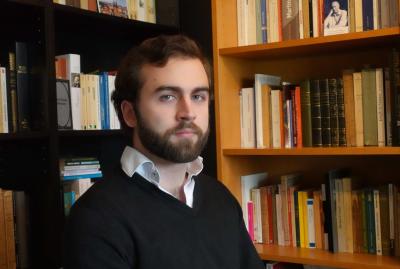

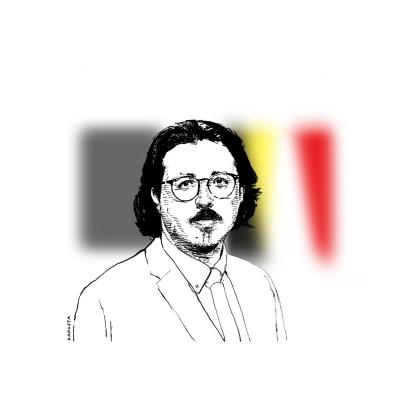
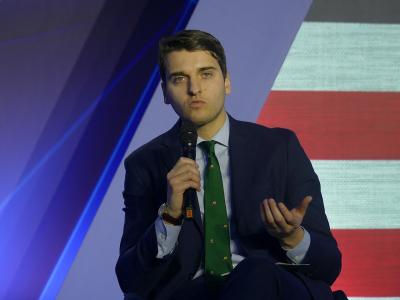

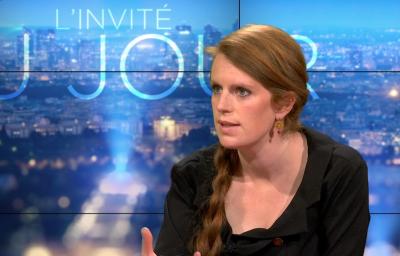

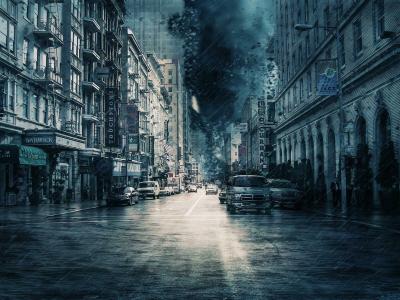

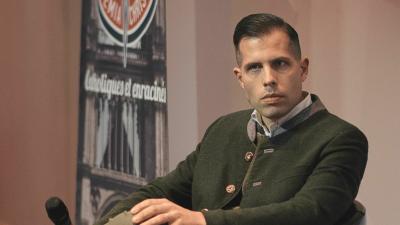

Comments (0)